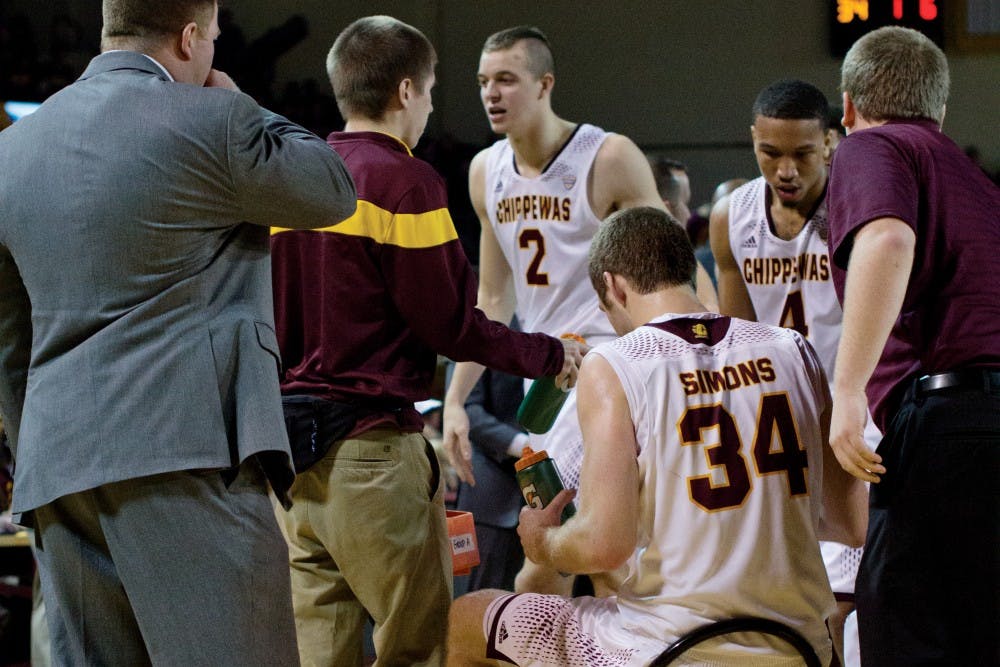Supporting the Stars: Athletic Trainers work behind the scenes to ensure student-athlete success

Holly sophomore Justin Birr stands with the team for the time out, after handing out water bottles to the men's basketball players at the game against Western Feb. 7 at McGuirk Arena.
As the Central Michigan University men’s and women’s basketball teams battle through the middle of the Mid-American Conference schedule, there is a staff of Chippewas keeping the men and women who wear maroon and gold healthy.
As the Chippewas practice each day, in the training room Associate Athletic Trainer Greg McGillvary and Assistant Athletic Trainer Joseph Fox prepare to aid the athletes with their strength, conditioning and daily health needs.
“It’s for the love of the profession and providing student healthcare for our student athletes,” said McGillvary. “Seeing them have success not only on the field, but in the classroom and later in life. It’s a good feeling to know I made a very small contribution to their success.”
McGillvary and Fox are just two of CMU’s seven full-time staff members training the 10 varsity athletic programs on campus.
Medical Director Jason Davenport and Head Athletic Trainer John Mason oversee the two trainers and their five graduate assistants.
Many members on the staff have been at CMU for more than a decade, including McGillvary who started in Mount Pleasant as a graduate assistant in 1981.
“A lot of us have been here for a lengthy time period,” said Assistant Athletic Trainer Robin Jones. “We have established strong relationships with the coaches and the athletes. You understand how they want to train the team. Our consistency has served our student athletes well.”
Jones started her career at the University of Iowa before coming to CMU as a graduate assistant in 2002.
Like many of her fellow staff members, she said she has always been interested in athletics and the science of athletic training.
“My high school did not have an athletic trainer,” Jones said. “But I have always enjoyed sports and been interested in the scientific aspect of the job.”
Jones works directly with the women’s basketball and field hockey teams and oversees the care of the gymnastics team as well.
Many trainers start their days at 5:00 a.m. with pre-practice taping and therapy. As the teams begin practice, trainers are on the sidelines helping athletes with consistent injuries, sicknesses or medical issues.
Afternoons are spent working with athletes who are scheduled for treatment. The trainers will put in more than 12 hours of work each day. Combine the long practice days with home games and away trips, and the time commitment grows substantially.
“The hours are grueling,” Fox said. “When someone gets sick or injured, we take care of them. Taking care of the athletes is the most rewarding part of my job.”
Fox has been working for CMU four years. He always wanted to work at the university following a long career of helping athletes in lower level colleges and Minor League Baseball.
Fox said coaches and professors might have the biggest impact on a student athlete’s growth as professionals, but athletic trainers watch a student athlete’s transformation physically.
“You see these guys come in as freshmen and they are skinnier kids,” Fox said. “An offensive tackle may have been 240 pounds when he played in high school. We see them gain 30 to 60 pounds of muscle in just over two years.”
Athletic trainers at CMU deal with a variety of people from all across the country. They must possess an ability to adapt to those they work with.
“To be an athletic trainer, you need to be a caring, dynamic person who has a general concern for people,” McGillvary said. “You have to have a genuine concern and care for people. That is the bottom line. You’re business is working with people. You must be a people person.”
CMU’s Athletic Training Program has been producing capable trainers for more than 40 years by giving students hands on experience in the classroom. Experience that is key to creating quality professionals according to McGillvary.
“It is very important that athletic training students gain some experience,” he said. “Gain as much experience in whatever you are going into. It gives you a great foundation for staying in the profession.”






